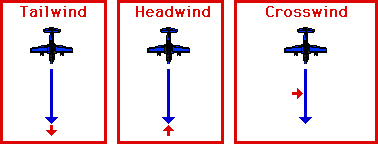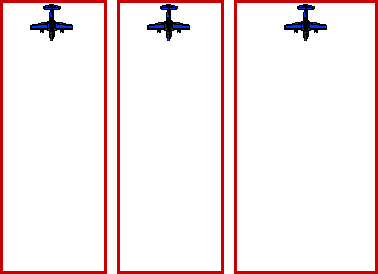
The Plane and The
Wind
A GIF Animation
Observe the three planes in the animation below. Each plane is
heading south with a speed of 100 mi/hr. Each plane flies
amidst a wind which blows at 20 mi/hr. In the first case, the plane
encounters a tailwind (from behind) of 20 mi/hr. The combined effect
of the tailwind and the plane speed provide a resultant velocity of
120 mi/hr. In the second case, the plane encounters a headwind (from
the front) of 20 mi/hr. The combined effect of the headwind and the
plane speed provide a resultant velocity of 80 mi/hr. In the third
case, the plane encounters a crosswind (from the side) of 20 mi/hr.
The combined effect of the headwind and the plane speed provide a
resultant velocity of 102 mi/hr (directed at an 11.3 degree angle
east of south). These three resultant velocities can be determined
using simple rules of vector addition. In the case of the crosswind,
the Pythagorean Theorem and SOH CAH TOA are utilized to determine the
magnitude and the direction of the resultant velocity.


For more information on physical descriptions of motion,
visit
The
Physics Classroom. Specific information is available there on the
following topics:
This page was created by
Tom
Henderson of
Glenbrook South
High School.
Comments and suggestions can be sent by e-mail to
Tom
Henderson.
This page last updated on 2/21/97.

